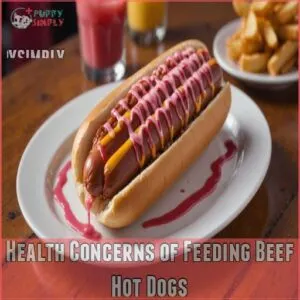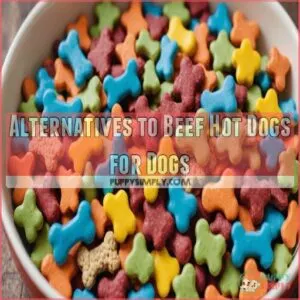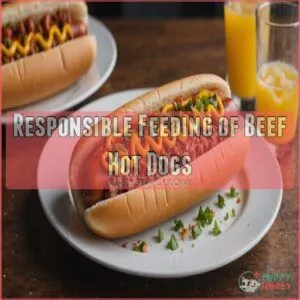This site is supported by our readers. We may earn a commission, at no cost to you, if you purchase through links.

Packed with fat and sodium, beef hot dogs should be more of an occasional indulgence than a staple.
You wouldn’t want Fido to fill up on these, as too many could lead to digestive troubles or even pancreatitis.
And watch those tiny ingredients—onion and garlic are the hot dog party crashers you definitely want to avoid.
So, keep it occasional and in moderation, and maybe consider healthier treats, like lean chicken or veggies, for wagging tails.
Curious about safer snacking? Stay tuned!
Table Of Contents
- Key Takeaways
- Can Dogs Eat Beef Hot Dogs?
- Safety of Beef Hot Dogs for Dogs
- Are Beef Hot Dogs Healthy for Dogs?
- What Happens if a Dog Eats a Beef Hot Dog?
- Feeding Beef Hot Dogs to Dogs in Moderation
- Health Concerns of Feeding Beef Hot Dogs
- Alternatives to Beef Hot Dogs for Dogs
- Can Puppies Eat Beef Hot Dogs?
- Beef Hot Dogs as Dog Treats
- Responsible Feeding of Beef Hot Dogs
- Frequently Asked Questions (FAQs)
- Are beef hot dogs ok for dogs?
- Can I feed my dog boiled hot dogs?
- What happens if my dog eats a hot dog?
- Are beef hot dogs fully cooked?
- Are beef hot dogs safe for elderly dogs?
- Can beef hot dogs affect a dogs allergies?
- How do beef hot dogs affect dog dental health?
- Are grilled beef hot dogs safe for dogs?
- How much beef hot dog is too much?
- Conclusion
Key Takeaways
- Always check the ingredients of beef hot dogs for harmful items like onions and garlic, and opt for those with minimal additives to keep your dog safe.
- Feed beef hot dogs as an occasional treat since they’re high in fat and sodium, which can lead to health issues like high blood pressure and pancreatitis, as consuming hot dogs can increase the risk of pancreatitis and health risks.
- Cut hot dogs into bite-sized pieces to prevent choking hazards, especially for smaller breeds.
- Consider healthier alternatives like grilled chicken or vegetables to reduce the risk of obesity and maintain a balanced diet for your dog.
Can Dogs Eat Beef Hot Dogs?
You might wonder if your furry friend can safely enjoy a beef hot dog alongside you at the barbecue.
While beef hot dogs are generally safe in moderation, it’s important to check the ingredients list and avoid anything immediately toxic, like onions or garlic.
Checking The Ingredients
Before giving your pooch a taste of beef hot dogs, always peek at the label.
Meat sources matter—choose beef with minimal additives.
Watch out for preservatives, artificial colors, and flavor enhancers lurking in the ingredients list.
They might make the hot dogs more appealing to you but could upset your dog’s tummy.
Think of it like a pesky mosquito buzzing at a picnic—best avoided!
Keeping it simple makes sure your furry friend stays safe and happy.
Avoiding Onions and Garlic
Regarding pet food safety, onions and garlic are more like mischievous gremlins than good ingredients.
Even a bit can cause onion toxicity or other problems, with symptoms ranging from upset stomach to more serious issues.
These popular seasonings are in many human foods, so always peek at the label.
Opt for safe alternatives like plain beef hot dogs without risky extras—because no one wants a dog in the vet’s office instead of wagging by your side.
Safety of Beef Hot Dogs for Dogs
Feeding your furry friend beef hot dogs can sound tempting, but it’s important to understand the potential risks, like food allergies and choking hazards.
While most dogs might gobble them up happily, keeping an eye on these factors helps create a safer snacking experience.
Risk of Food Allergies
Dog food sensitivities are no joke, especially when you’re dealing with a gourmet like your furry friend.
Common allergens found in beef hot dogs can trigger reactions ranging from itchy skin to tummy troubles.
Beef hot dogs are also high in fat and sodium, which can cause health problems, so you should consume them in moderation only.
It’s like a game of detective work to identify these pesky triggers.
Always read ingredient labels closely.
Keep an eye out for safe alternatives to those allergens, ensuring snack time remains a wag-worthy event without the drama of an unexpected vet visit.
Choking Hazard
Food allergies aside, whole hot dogs pose a significant choking hazard for dogs.
Their size makes them difficult to manage, especially for smaller breeds.
Always cut beef hot dogs into small, treat-sized pieces to prevent this.
Think bite-sized—smaller is safer!
Consider giving chew toys alongside treats to keep your furry friend occupied and prevent accidental gulping.
Remember, dog safety is paramount; preventing choking is a top priority.
Are Beef Hot Dogs Healthy for Dogs?
Beef hot dogs might seem like a tasty treat for your dog, but they’re not exactly healthy.
With their high fat and sodium content, regularly feeding them to your furry friend could lead to some unwelcome health issues—no one wants a pooch with high blood pressure!
High in Fat
Picture sitting on the couch, sharing snacks with your furry friend.
Before tossing a beef hot dog their way, consider the high fat content.
Too much fat can lead to:
- Weight gain
- Pancreatitis risk
- Liver issues
- Gallbladder problems
- Digestive discomfort
Instead, offer healthier options like sliced veggies or lean meats.
Remember, what seems like a small treat could “weigh” heavy on your pup’s health.
Aim for balance and moderation to keep your tail-wagging buddy healthy!
High in Sodium
Did you know that beef hot dogs pack quite a sodium punch?
That tasty treat you’re about to share with Fido might’ve him reaching for his water bowl more than usual.
Too much sodium isn’t just a thirst quencher; it can mess with kidney health and spike blood pressure.
| Issue | Potential Effect | Pro Tip |
|---|---|---|
| High Sodium | Dehydration risk | Cut back on hot dogs |
| Kidney Health | Long-term damage | Opt for low-sodium |
| Blood Pressure | Increased levels | Monitor intake closely |
Keep an eye on those paws!
What Happens if a Dog Eats a Beef Hot Dog?
If your dog accidentally gobbles up a beef hot dog, it might experience some digestive issues like an upset stomach or diarrhea.
While one hot dog probably won’t harm your furry friend, you should keep an eye out for signs of pancreatitis, especially if they’ve a sensitive tummy or are prone to digestive problems.
Potential Digestive Issues
While beef hot dogs might seem like a treat, they can cause potential digestive issues for your dog.
Here are the main problems to look out for:
- Stomach Upset: High-fat content might irritate sensitive tummies.
- Dog Food Allergies: Allergic reactions are always a concern.
- Diarrhea and Gas: Processed meat can disrupt digestion.
- Vomiting: An upset stomach can lead to unwanted cleanups.
Next time your dog begs for a bite, think twice!
Risk of Pancreatitis
If your dog wolfed down a beef hot dog, keep an eye out for pancreatitis symptoms like vomiting or abdominal pain.
High-fat foods like hot dogs can trigger this serious condition, especially in breeds prone to dog obesity.
| Common Symptoms | What to Watch | Preventive Tips |
|---|---|---|
| Vomiting | Lethargy | Choose low-fat treats |
| Diarrhea | Belly pain | Monitor portion sizes |
| Loss of appetite | Fever | Adjust dietary changes |
| Dehydration | Dehydration | Regular exercise |
Being cautious with snacks helps prevent trouble down the line.
Feeding Beef Hot Dogs to Dogs in Moderation
So, you want to give your pup a little taste of that beef hot dog?
Remember, moderation is key – think of it as a special, occasional treat, not a daily meal, to keep your furry friend happy and healthy.
Cutting Into Bite-Sized Pieces
You know how kids can bite off more than they can chew?
Dogs aren’t much different.
To help prevent choking, cut beef hot dogs into bite-sized pieces.
This safe treat size is good for dogs of any age, including puppies and small breeds.
Think about cutting it down to about the size of a blueberry.
This helps avoid choking but also makes it easier for them to savor without the gulp factor.
Using as an Occasional Treat
Turning those beef hot dogs into bite-sized bits isn’t just about safety; it’s also about moderation, especially considering hot dogs contain unhealthy additives like sodium nitrate and MSG.
Tossing the entire frank to your dog might seem like a treat, but it’s a fast track to dog obesity.
Imagine hot dogs as an occasional treat, akin to dessert after a healthy meal. Keep treat frequency in check, and consider treat alternatives like homemade goodies.
Just like us, dogs deserve variety without overindulging, so balance is key!
Health Concerns of Feeding Beef Hot Dogs
When considering beef hot dogs for your dog’s treat lineup, it’s important to be aware of potential health concerns.
From the risk of colorectal cancer linked to processed meats to the impact on kidney health due to high sodium content, these tasty treats need a careful approach.
Colorectal Cancer Risk
In the dog world, processed meat—like beef hot dogs—can dim the light on your furry friend’s health.
Human studies on colorectal cancer risk indicate potential hazards even for dogs, and while this research doesn’t directly translate to canine health, it’s worth considering the potential link to cancer risks associated with such foods.
The meaty goodness may have adverse impacts.
So how can you promote dog health? Here’s a playful checklist:
- Limit Processed Meat: Reserve hot dogs for special pet occasions.
- Cancer Prevention: Choose healthier snacks.
- Balanced Diet Impact: Maintain variety.
- Check Ingredients: Opt for simpler options.
Impact on Kidney Health
Imagine your dog as a little sponge, soaking up everything he eats.
Beef hot dogs can pack quite a punch with their high sodium levels, which isn’t great news for his kidneys.
A single hot dog can exceed a dog’s daily salt intake, leading to dehydration risks.
Dogs with kidney disease already have a tough time keeping their kidneys in check.
Too much sodium might elevate blood pressure, increasing dehydration risk, and straining kidney function.
So, keeping hot dogs as a rare treat can help your furry friend stay healthy and happy.
Alternatives to Beef Hot Dogs for Dogs
If you’re looking for healthier alternatives to beef hot dogs for your furry friend, consider options like grilled chicken, lean beef, or even crunchy vegetables.
These treats also keep your dog’s tail wagging but also help maintain a balanced diet without unnecessary fats and sodium.
Grilled Chicken or Lean Beef
Many dog owners find grilled chicken or lean beef a much safer alternative to hot dogs.
Chicken boasts impressive nutritional value, offering a good protein content with lower fat content than beef.
Remember to cook it thoroughly!
Comparing chicken vs beef, both provide protein, but chicken often wins on the lower fat content front.
Choose lean cuts and avoid added seasonings.
Safe cooking methods are key to preventing bacterial issues.
Vegetables
Consider giving your furry friend a veggie treat instead of beef hot dogs.
Carrots and celery offer a crunch without the guilt.
These dog-friendly vegetables are safe and even nutritious, providing a low-calorie snack option.
Just slice them into manageable bits to avoid any mishaps.
Remember, your pup’s taste buds might just appreciate this healthy change!
Meat Treats
After veggies, how about meat treats as tasty alternatives? Homemade options like chicken bites or turkey jerky make for healthy indulgences. You can try:
- Homemade meat treats that avoid fillers
- Meat treat recipes from safe, whole ingredients
- Healthy meat treats low in sodium
- Dog food alternatives without added preservatives
- Meat treat brands prioritizing quality
Keep portions small!
Can Puppies Eat Beef Hot Dogs?
You might wonder if your adorable puppy can join in on the beef hot dog fun, but it’s essential to think about the health risks.
While puppies have zest and boundless energy that makes them seem invincible, their still-developing bodies are especially sensitive to high sodium and fat content.
Age Restrictions
Regarding puppies, those little bundles of energy and curiosity, age restrictions matter.
You might wonder if beef hot dogs are safe for your young dogs.
Puppies should avoid them until they reach maturity.
Why? Simply put, their developing digestive systems can’t handle such rich foods.
Adult dogs may indulge occasionally, but for puppies, stick to their age-appropriate diet to keep them safe and healthy.
Patience and puppy-friendly snacks are key!
Health Risks
Feeding puppies beef hot dogs might seem like a treat, but there are health risks to keep in mind.
High sodium content can lead to dehydration—think of it as the puppy version of scarfing down a bag of salty chips!
Consider these four concerns:
- Obesity: High fat levels can lead to weight gain.
- Allergies: Unknown additives may trigger reactions.
- Pancreatitis: High-fat diets can cause this painful condition.
- Sodium overload: Puppies need balance, not extra salt!
Beef Hot Dogs as Dog Treats
When you’re rewarding your pup for fetching that tennis ball like a champ, using beef hot dogs as treats can be tempting.
Just remember, moderation is key to keeping your furry friend happy and healthy, as these tasty morsels are best enjoyed in small, training-sized pieces.
Training Treats
A few tiny bits of hot dog can work wonders as training treats.
Remember, moderation is key! Too many hot dogs, even small pieces, can upset their tummies.
Consider healthy alternatives like small pieces of cooked chicken or carrot sticks for a better balance, and look for low-sodium options like beef jerky alternatives.
Focus on training strategies that don’t rely heavily on treats.
Think of it as a fun game, not just a reward system.
Always prioritize your pup’s health and well-being.
Homemade recipes using healthier ingredients are a great option too! Check the ingredients carefully and monitor treat frequency.
Reward Treats
You know how dogs work for those training treats?
You can even find special hot dog dog reward products online, such as those at hot dog dog rewards.
Well, beef hot dogs can become a special reward too.
It’s like handing them the golden ticket after a good fetch game!
Just remember, moderation’s the name of the game since these salty snacks pack a punch.
Slice them small to keep your pup from gulping them whole.
And hey, always have that fresh water ready—it’s like offering a cool drink after a tasty snack adventure.
Responsible Feeding of Beef Hot Dogs
When feeding beef hot dogs to your dog, it’s important to keep an eye on sodium intake to prevent dehydration and potential health issues.
Always provide fresh water afterward, because nobody wants a parched pup pouting by the water bowl!
Monitoring Sodium Intake
Keeping an eye on sodium levels in beef hot dogs is like monitoring your dog’s health through a magnifying glass.
Too much salt can cause problems, especially for dogs with kidney disease.
As noted in the guide to dog food for kidney disease, managing sodium intake is essential for reducing stress on the kidneys.
Think of it like offering a single salty chip; tasty, but best in moderation.
Watch how your dog feels after they’ve had a treat with extra sodium, and adjust accordingly.
Your pup’s well-being trumps any momentary snack pleasure!
Ensuring Access to Fresh Water
When serving beef hot dogs to your furry friend, imagine it like a beach day—hydration is key.
Dogs need plenty of fresh water to wash down that salty snack.
And make sure you’ve got a reliable water bowl for your pup!
Keep those water bowls filled to make sure your pup stays hydrated after indulging in a hot dog treat.
This simple tip not only quenches thirst but also helps regulate sodium intake.
So, always provide access to water, because even dogs need a cool break!
Frequently Asked Questions (FAQs)
Are beef hot dogs ok for dogs?
Beef hot dogs aren’t ideal for your pup. They’re high in sodium and fat, potentially causing tummy troubles. A small, occasional bite won’t kill them, but stick to dog-friendly treats!
Can I feed my dog boiled hot dogs?
Think of boiled hot dogs as a treat, not a meal.
They’re safe in moderation but watch for sodium and fat, which can upset your dog’s stomach.
Always cut them into small pieces to avoid choking.
What happens if my dog eats a hot dog?
If your dog eats a hot dog, they’ll likely be fine, but watch for signs of upset like vomiting or diarrhea.
Due to high sodium and fat, limit them as treats.
Always keep fresh water available.
Are beef hot dogs fully cooked?
Toss your worries aside!
Most beef hot dogs you find in stores are fully cooked and ready to eat straight from the package.
Just remember, though, they’re meant for humans, not canine pals, due to high salt content.
Are beef hot dogs safe for elderly dogs?
Beef hot dogs can be safe for elderly dogs, but moderation is key.
They’re high in salt and fat, which could stress older dogs’ kidneys and hearts.
Opt for low-sodium options and cut them into small pieces.
Can beef hot dogs affect a dogs allergies?
Dogs can have beef hot dogs, but ingredients matter.
Watch out for mixed proteins and additives, which may trigger allergies.
Always check for onions or garlic, as they can be harmful, especially for sensitive doggies.
How do beef hot dogs affect dog dental health?
Hot dogs aren’t ideal for your pup’s pearly whites. The high sodium content and sticky texture can contribute to plaque buildup and gum disease. Stick to dog-friendly dental chews instead!
Are grilled beef hot dogs safe for dogs?
Grilled beef hot dogs can be okay for dogs in moderation.
Make sure they’re fully cooked, avoid seasoning, and cut into small pieces to prevent choking.
Watch for stomach upset due to high fat and sodium content.
How much beef hot dog is too much?
While you might love hot dogs, your furry friend shouldn’t overindulge.
Just one should be an occasional treat, as too many can lead to upset stomachs and obesity.
Always make sure they’re cooked and cut into small pieces.
Conclusion
Before you dismiss beef hot dogs as treats for your dog, it’s important to weigh the risks.
Sure, dogs can eat beef hot dogs, but moderation is key.
High fat and sodium levels aren’t great for dogs, those sneaky onions or garlic are a no-go, and you definitely don’t want digestive issues or pancreatitis on your hands.
Instead, reach for healthier treats like grilled chicken or veggies to keep tails wagging and your pet’s health intact.















